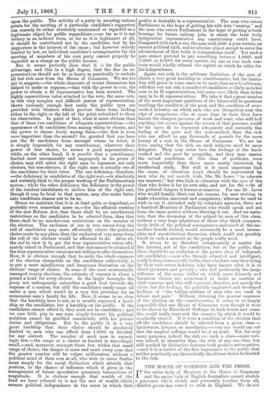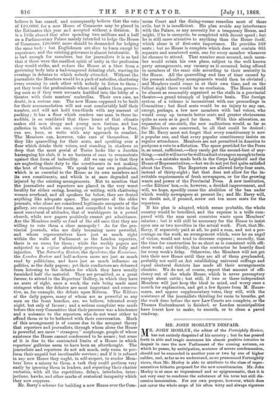THE HOUSE OF COMMONS AND THE PRESS.
IF the entire body of Members in the House of Commons and the entire body of English Journalists cannot abolish a grievance which closely and personally touches them all, effective power has ceased to exist in England. We do not
believe it has ceased, and consequently believe that the vote of 120,000/. for a new House of Commons may be placed in the Estimates this year and accepted without a division. It is a little absurd that after spending two millions and a half on a Parliamentary Palace mainly intended to lodge the House is a little absurd that after spending two millions and a half on a Parliamentary Palace mainly intended to lodge the House of Commons, 120,0001. more should be demanded for lodging the same body ; but Englishmen are slow to learn except by experience, and the existing grievance is almost intolerable. It is bad'l enough for members, but for journalists it is so bad that ii there were the smallest spirit of unity in the profession they would strike, and reduce the House at a blow from a governing body into a bad-tempered debating club, wasting its evenings in debates to which nobody attended. Without the journalists the Members would be a pack of nobodies, chattering every evening to each other with nobody to listen to them ; yet they treat the professionals whose aid makes them govern- ing men as if they were servants huddled into the lobby of a
theatre with their masters' umbrellas. Their own case, no doubt, is a serious one. The new House supposed to be built for their accommodation will not seat comfortably half their number, and will not hold two-thirds with any amount of packing ; it has a floor which renders one man in three in- audible, is so ventilated that three hours of that climate makes old men sleepy and young men furious, and has galleries in which no one, except he be perhaps a Peer, can see, hear, or write with any approach to comfort. The Members can, however, take care of themselves. If they like quarrelling for their seats, and speaking over a floor which drinks their voices, and standing in shadows so deep that the most genial of Tories looks like a Jacobin haranguing his club, it is no business of ours to remonstrate against that form of imbecility. All we can say is that they are neglecting their duty to the constituents in not making the best of themselves. We speak for our own profession, which is as essential to the House as its own members and its own constituents, and which is at once degraded and injured by the existing arrangements. Not to mention that the journalists and reporters are placed in the very worst locality for either seeing, hearing, or writing, with chattering women overhead, and all speakers far below, they are denied anything like adequate space. The reporters of the older journals, who alone are considered legitimate occupants of the gallery, are cramped for room, and compelled to write in the most unnatural of attitudes, that of worshippers in a pewed church, while new papers positively cannot get admittance. Are the Members really so fond of the old ones that they are willing to vote them a close monopoly ? As for the pro- vincial journals, who are daily becoming more powerful, and whose representatives have just as much right within the walls of Parliament as the London reporters, there is no room for them ; while the weekly papers are subjected to a regime absolutely grotesque in its folly and injustice. The Saturday Review, the Spectator, the Examiner, the London Review and half-a-dozen more are just as much read by politicians, and have just as much influence on politics, as the daily papers ; yet their conductors are debarred from listening to the debates for which they have usually furnished half the material. They are permitted, as a great favour, to attend in the Reporters' Gallery, in which they have no seats of right, once a week, the rule being made most stringent when the debates are most important and consecu- tive, as, for example, the debate upon Reform. The Editors of the daily papers, many of whom are as powerful as any men on the front benches, are, we believe, tolerated every night, but only of favour ; and a serious complaint was made before this very Committee that their presence was a hindrance and a nuisance to the reporters, who do not want either to offend them or to be bothered with their conversation. Much of this arrangement is of course due to the arrogant theory that reporters and journalists, through whom alone the House is powerful, are mere " strangers," surplusage, people of whose existence the House cannot condescend to be aware ; but some of it is due to the contracted limits of a House in which reporters' galleries seem to have been an afterthought. The journalists and reporters do not ask much, only room to per- form their unpaid but inestimable services ; and if it is refused in any new House they ought, in self-respect, to render Mem- bers' lives a misery to them, a task they could perform very easily by ignoring them in leaders, and reporting their chatter verbatim, with all the repetitions, delays, interludes, inter- jections, hawks, and other marks of oratorical incapacity which they now suppress.
Mr. Barry's scheme for building a new House over the Com- mons Court and the dining-rooms remedies most of these evils, but it is insufficient. His plan avoids any interference with the Palace, or any necessity for a temporary House, and might, if he is energetic, be completed with decent speed ; but he is still more attentive to anything than the House itself, which alone is of first-rate importance. He provides 569 seats ; but no House is complete which does not contain 665 separate and numbered seats, one for every member whenever he chooses to attend. That number once secured, each mem- ber would retain his own place, subject to the well known party arrangements, any vacancy as it occurred being offered to members of the same side according to their seniority in the House. All the quarrelling and loss of time caused by the present schoolboy arrangements would then be obviated ; and Members could come in at their own time, and on the fullest night there would be no confusion. The House would be almost as reasonably organized as the stalls in a provincial theatre—a grand triumph of legislative brain. The foreign system of a tribune is inconsistent with our proceedings in Committee ; but fixed seats would be no injury to any one, except, perhaps, a few new members with bad voices, who would creep up towards better seats and greater obviousness quite as soon as is good for them. With this alteration, an expansion of one-sixth, the new auditorium would, as far as the Members are concerned, be all that could be desired ; for Mr. Barry must not forget that every constituency is now a popular one, and that every popular constituency insists on regular attendance. Members are not permitted in America to postpone a vote to a flirtation. The space provided for the Peers is, as usual, sufficient,—they rarely get the second-best of any- thing,—and it will never be well to admit strangers enough to form a mob,—a mistake made both in the Corps Legislatif and the House of Representatives,—but we do not yet feel quite satisfied about the Press. The Reporters are allowed forty-four seats, instead of thirty-eight ; but that does not allow for the in- evitable requirements of fresh newspapers, or for the growing wants and power of the Provincial Press. A new institution, —the Editors' box,—is, however, a decided improvement, and will, we hope, speedily cause the abolition of the ban under which weekly newspapers at present lie ; and Mr. Barry will, we doubt not, if pressed, screw out ten more seats for the reporters.
If his plan is adopted, which seems probable, the whole country would be benefited, and the expense is a trifle com- pared with the sum most countries waste upon Members' salaries ; but it will still be necessary for the House to insist upon one or two novelties in the actual work. First, that Mr. Barry, if separately paid at all, be paid a sum, and not a per- centage on the work, an arrangement which, were he an angel of virtue, would not tend to decrease expense ; secondly, that the time for construction be as short as is consistent with effi- cient work ; and thirdly, that the contractor be heavily fined for every week's delay. Otherwise, the Members will not get into their new House until they are all of them greyheaded, probably not until an Act establishing universal suffrage and equal electoral districts has made all their arrangements obsolete. We do not, of course, expect that amount of effi- ciency out of the whole House, which is never peremptory except about cattle ; but still, if two or three independent Members will just keep the ideal in mind, and worry once a month for explanation, and get a few figures from M. Hams- mann, and oppose supplementary votes, they will, with the assistance of the journalists thirsting for room to breathe, get the work done before the new Law Courts are complete, or the Thames Embankment is finished, or London municipalities have learnt how to make, to smooth, or to clean a paved roadway.































 Previous page
Previous page